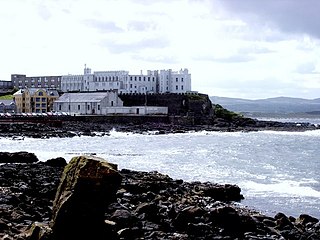Mary Margaret O'Hara is a Canadian singer-songwriter, actress and composer. She is best known for the album Miss America, released in 1988. She released two albums and an EP under her own name, and remains active as a live performer, as a contributor to compilation albums and as a guest collaborator on other artists' albums.
Tim or Timothy O'Brien may refer to:
Neil is a masculine name of Irish origin. The name is an anglicisation of the Irish Niall which is of disputed derivation. The Irish name may be derived from words meaning "cloud", "passionate", "victory", "honour" or "champion". As a surname, Neil is traced back to Niall of the Nine Hostages who was an Irish king and eponymous ancestor of the Uí Néill and MacNeil kindred. Most authorities cite the meaning of Neil in the context of a surname as meaning "champion".
Beckett is an English surname. Notable people with the surname include:
Keenan is an Irish surname meaning 'ancient, distant' in the Irish language. It is derived from ÓCianáin 'descendant of Cianán'. The Ó Cianáin clan were hereditary historians to the Mac Uidhir.
Clancy is an Irish name coming from the Gaelic Mac Fhlannchaidh/Mac Fhlannchadha, meaning "Son of the red/ruddy warrior", or as a hypocorism for Clarence. The surname originated from two different families, one in Thomond and one in the present day County Leitrim.

Dominican College Portstewart is a grammar school in Portstewart, County Londonderry, Northern Ireland. It is situated on a cliff overlooking the Atlantic Ocean with views over Portstewart's promenade, the northern coastline of Northern Ireland and the County Donegal hills in the Republic of Ireland.
Máire is a feminine given name. It is the Irish language form of Maria, which was in turn a Latin form of the Greek names Μαριαμ (Mariam), and Μαρια (Maria), found in the New Testament. Both New Testament names were forms of the Hebrew name מִרְיָם (Miryam).
Millar is a surname. Notable people with the surname include:
Bill Cunningham may refer to:
Maureen is a female given name. In Gaelic, it is Máirín, a pet form of Máire, which is derived from the Hebrew Miriam. The name has sometimes been regarded as corresponding to the male given name Maurice.
O'Malley is an Irish surname.
Farrell is a surname of Irish origin. It is the anglicized form of the Gaelic patronym Ó Fearghail. The Farrells were hereditary Chiefs and Princes of Annaly.

Molly is a diminutive of the feminine name Mary that, like other English diminutives in use since the Middle Ages, substituted l for r. English surnames such as Moll, Mollett, and Mollison are derived from Molly. Molly has also been used as a diminutive of Margaret and Martha since the 1700s and as an independent name since at least 1720. The name was more popular in the United States than elsewhere in the Anglosphere in the 1800s due to usage by Irish-American families and by Jewish American families who used Molly as an English version of Hebrew names such as Miriam and Malka. Its popularity with Americans was also influenced by stories about Molly Pitcher, a heroine of the American Revolutionary War.
O'Doherty is an Irish surname, which is derived from the O'Doherty clan.
Nuala is an Irish feminine given name, derived from Irish mythology - being either a diminutive form of Fionnuala, the daughter of Lir, or an alternate name for Úna, wife of Finvarra, king of the fairies.
O'Hara is a surname. The death of the eponym – Eaghra Poprigh mac Saorghus, lord of Luighne, in Connaught – is mentioned in the Annals of the Four Masters in 926. Notable people with the surname include:
Juliet is a character in Shakespeare's play Romeo and Juliet.
Egan is a surname that comes from the Irish Gaelic name Mac Aodhagáin. It is derived from the root 'aedh' meaning little fire and the diminutive 'an' hence 'the little bright-eyed one'. Variations include: Egan, Eagan, Keegan, McKeegan, MacEgan, Kegan, Keagan and Egen. The name originates from County Tipperary (north). The Egans have been around for thousands of years and own a castle in Tipperary, Ireland, called Redwood Castle.
This page is based on this
Wikipedia article Text is available under the
CC BY-SA 4.0 license; additional terms may apply.
Images, videos and audio are available under their respective licenses.

